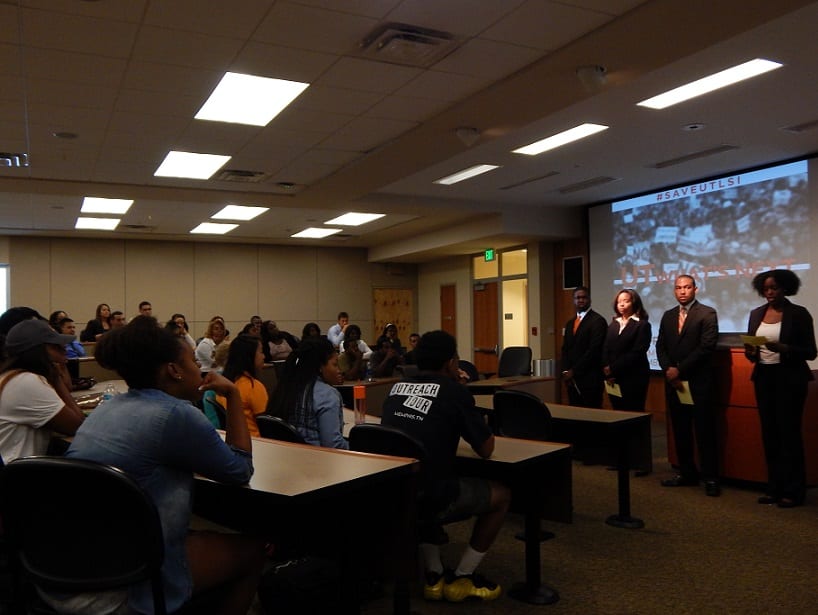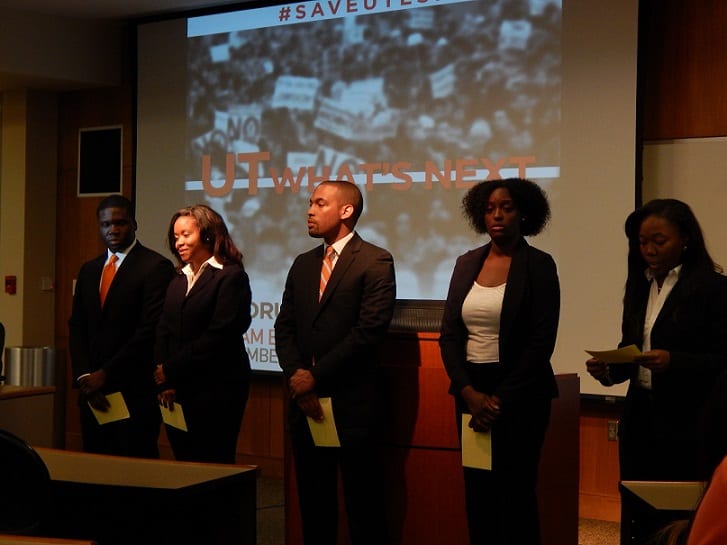UTLSI committee makes the case for reinstatement
The University of Tennessee Lead Summer Institute held its forum, “What’s Next UT?” Tuesday at 7 p.m. in the Haslam Business Building. This past summer funding for the UTLSI program was cut and recent graduates of the program were told that they would be the last.

Audiences members included recent UTLSI graduates as well as alumni of the University of Tennessee.


#SaveUTLSI
That is the hashtag that a committee of students are using to save the University of Tennessee Lead Summer Institute. These days, the hashtag is making its rounds on Twitter and Facebook as the alumni of the recently defunded UTLSI program strive to reinstate it.
The UTLSI committee held its forum, “What’s Next UT?” Tuesday at 7 p.m. in the Haslam Business Building. The committee gave a brief explanation for their formation and a description of the history of the UTLSI program.
Created in 2008, the conditional access program was used to prepare incoming freshmen for life as a college student. Each year, more than 40 minority students would spend four to five weeks on campus. During the program, these students would earn eight hours of college credit and receive a stipend of $1,500. This past summer funding for the UTLSI program was cut and recent graduates of the program were told that they would be the last.
Graduates of the program questioned the discontinuation and went to the program’s directors—Eric Stokes and Stella Bridgman-Prince—as well as several administrators for answers and discovered that Stokes and Bridgman-Prince had no part in the decision to cut funding for UTLSI. They also discovered that Rickey Hall, vice chancellor for diversity, and Melissa Shivers, dean of Student Affairs, were also not involved in the decision. After learning this information, a group of student leaders formed the UTLSI committee.
During the presentation, committee members outlined the past programs and scholarships that were used to promote diversity and increase the number of minority students enrolled at the university, including the discontinued African-American Achievers scholarship. They also compared UTLSI to several current college preparatory programs UT offers to incoming freshmen and highlighted the distinct differences between them.
Committee members also challenged UT’s “Journey to the Top 25,” the initiative to have the University of Tennessee ranked as one of the 25 best public universities in the “U.S. News and World’s Report” college ranking. Rilwan Balogun, committee member and senior majoring in Journalism and Electronic Media, pointed out that many universities that are in the top 25 have managed to increase low-income and minority enrollment.
“Why cut a program that the other top 25 institutions are doing?” Balogun asked.
Balogun also pointed out that UT’s ranking fell three spots Tuesday, from No. 47 to No. 50.
“So, our top 25 initiative is kind of going down,” Balogun said.
In response to concerns about the cost of UTLSI, Balogun acknowledged that the program is expensive. Balogun also said that UT is currently spending approximately $1 million on athletic recruits, and that the university is getting athletes from the same low-income areas that UTLSI students come from. Balogun, along with committee member Laquesha Wilson, called this practice the “Reverse Robin Hood Method.”
“We’re taking from the poor—taking the athletes, all of the athletically advantaged students—and we’re putting them in richer communities so that we can make money off of them,” Wilson said.
Graduates of the program were allowed to come to the podium and give testimonies about how the UTLSI program affected them. Many of the student stated that they would not be attending UT if it were not for the program.
Syretta Asberry, a recent graduate of UTSLI, said that the program has helped her stay in school.
“Without UTLSI, I would have came here in the fall, lost and confused, crying, probably have dropped out before the first semester even finished,” Asberry said. “And I really feel like this program was beneficial to me.”
Maarifa Arnett, a senior, brought up UT’s revised budget for the 2013-2014 academic year during his testimony.
“Revenue from tuition has gone up $413,598. Then revenue from programming and service fees went up $685,000 and student fees went up $646,000,” Arnett said. “So this is all revenue that the institution is receiving, yet programs like this get cut and makes people feel as though they don’t care and we don’t matter.”
Committee member Chris Smith urged students to contact administrators about the issue. Committee members handed out sheets with the phone numbers and emails of UT President Joe DiPietro, Chancellor Jimmy Cheek, Vice Chancellor of Diversity Rickey Hall and Dean of Students Melissa Shivers printed on them.
The UTLSI committee is currently scheduling a meeting with Chancellor Cheek to discuss the issue in greater detail.
The committee can be reached at the UTLSI Facebook or twitter page. Any questions or concerns can be for the committee can be sent to utlsicommittee@gmail.com.
Edited by Jessica Carr
News editor, Courtney Anderson, has been telling stories for as long as she can remember. From scribbling short stories on the back of pamphlets to excelling in Advanced Placement English courses in high school, Anderson has always been determined to make a career out of writing. Anderson joined TNJN as a freshman and instantly fell in love with online news. She hopes to become an editor for a major online news source one day.

